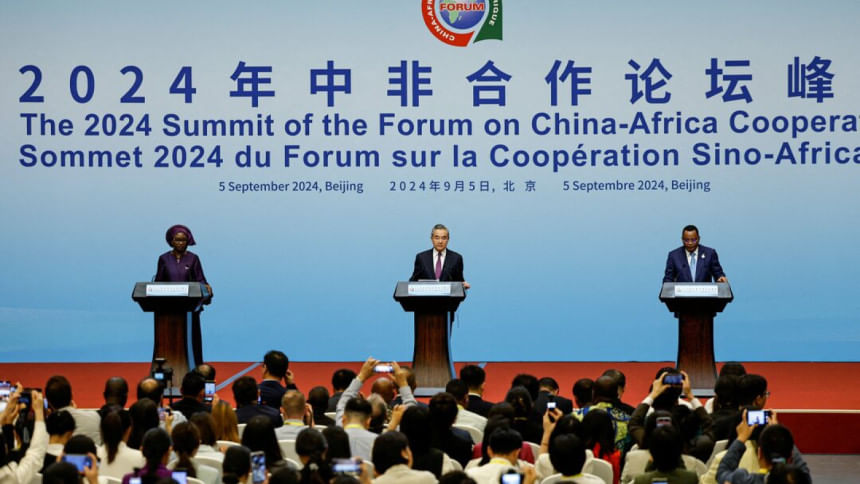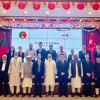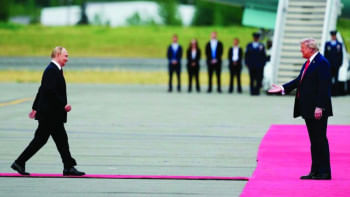How China rewired global power at the Changsha summit

The Chinese city Changsha's humid air was thick with summer heat as delegations from not just a few allies or a bloc, but an entire continent congregated there in June, creating history. Presidents, prime ministers, and foreign ministers from 53 African nations, along with the African Union Commission, filled the halls. The only African country absent was Eswatini; its seat empty due to its ties with Taiwan. This was no ordinary summit; it was China's diplomatic feat of the century, securing a near-unanimous African pledge to fundamentally challenge the Western-led world order.
Think about that number: 53 out of 54. Even at the height of superpower rivalry, Africa was a fractured chessboard—nations pulled between Washington and Moscow, Paris and London, playing one side against the other. Never before had such overwhelming continental unity been marshalled behind a single alternative vision for running the world order. The communiqué from Changsha wasn't wrapped in niceties. It was a direct, assertive declaration of a new alignment. African nations collectively rejected "unilateralism, protectionism and economic bullying," explicitly calling on "the United States in particular" to return to resolving trade disputes "through consultation based on equality." These were not abstractions but a rebuke of US tariffs and sanctions, widely seen in the Global South as tools of dominance.
But this was not merely a statement against something. It was a powerful affirmation for China's blueprint. The gathered nations threw their weight fully behind China's "Three Global Initiatives"—the Global Development Initiative, the Global Security Initiative, and the Global Civilisation Initiative. Think of these as Beijing's answer to the pillars of Western hegemony, offering an alternative framework for economic cooperation, security architecture, and cultural norms—all centred on principles like "non-interference" and "win-win cooperation." They pledged to pair these with the Belt and Road Initiative (BRI), further binding Africa's future to Chinese engagement. This was the institutionalisation of a China-centric vision for global governance, endorsed by a bloc representing over a quarter of the United Nations' membership and a significant share of the world's population and resources.
How did China pull this off? Not just with ideology or shared resentment of the West—though those played a role—but through an audacious economic gambit addressing Africa's trade grievances. China announced it would grant zero-tariff access to its vast market on 100 percent of tariff lines for all 53 participating African nations. This was no minor tweak. Previously, such preferential treatment was largely reserved for Least Developed Countries (LDCs).
Now, major economies such as South Africa, Nigeria, Kenya, and Ghana—producers of value-added goods—join the LDCs in gaining unprecedented duty-free entry to the world's second-largest consumer market. This directly addresses the staggering $62 billion trade surplus China holds with Africa, often cited as evidence of an unequal relationship. It is a concrete move, documented in the summit's action plan, promising streamlined customs procedures, enhanced marketing support for African goods in China, and skills training. With this, China put a substantial offer on the table.
The geopolitical chess move regarding Taiwan was equally calculated. With only Eswatini absent due to its recognition of Taipei, the summit became a showcase of Taiwan's isolation. Multiple African foreign ministers, from countries such as the Democratic Republic of Congo, Ghana, and Burkina Faso, used their bilateral meetings in Changsha to publicly and forcefully reaffirm the "One-China Principle." Guinea-Bissau even announced "reciprocal measures" against US tariffs in direct coordination with China, showcasing how this new alignment translates into tangible geopolitical support. The message was unmistakable: challenge China's core interests like Taiwan, and risk pushback from an entire continent.
This gathering marks the forum on China-Africa Cooperation (FOCAC)'s shift from talk to the engine of South-South solidarity. The summit laid out concrete plans: the 2026 China-Africa Year of People-to-People Exchanges, ten partnership actions for modernisation, and explicit support for the African Union's Agenda 2063. This is about building lasting structures. As the declaration boldly stated, China and Africa aim to "stabilise this uncertain world with the certainty of the China-Africa relationship." This is the language of a new pole of power asserting itself.
Let's be clear: this is a direct challenge to the post-World War II, Western-dominated system. The Changsha Declaration explicitly commits its signatories to defend the "UN-centred international system" and the "WTO-centred multilateral trading system"—but crucially, framed within the vision of an "equal and orderly multipolar world." The subtext is clear: the current system is seen as unequal and disorderly, skewed by American power. China, with Africa's backing, is positioning itself as the architect of the alternative. Together, they pledge to oppose all forms of unilateral sanctions—a direct challenge to one of the US and EU's favoured foreign policy tools. This is the practical manifestation of the "multipolar world" theory, moving from academic debate to geopolitical reality. It creates a counterweight bloc with the numbers and resources to dilute Western influence in international institutions and set different norms, particularly on sovereignty and non-interference.
The echoes of the 1955 Bandung Conference, where newly independent Asian and African nations first asserted their voice, are undeniable. But Changsha is Bandung 2.0, with teeth and treasury. Where Bandung was aspirational, Changsha is operational. Where Bandung lacked a unifying economic engine or a single great-power patron capable of matching the West, Changsha has China—with deep pockets, massive industrial capacity, and unwavering strategic focus. The institutional framework (FOCAC), binding economic integration (zero tariffs), and the explicit targeting of a specific great power (the US) mark a quantum leap in Global South coordination.
For policymakers in Washington, Brussels, and London, this should be a wake-up call delivered with a gong. The assumption that Africa remains a fragmented space where traditional powers can maintain influence through aid or historical ties is shattered. China has demonstrated an unparalleled ability to marshal continent-wide consensus around its agenda, blending ideological framing, economic incentives, and diplomatic pressure with potent effect. It offers a model of engagement—rightly or wrongly perceived by many African leaders as less paternalistic than the West's—centred on tangible infrastructure, market access (now dramatically expanded), and a hands-off approach to domestic governance. As Ethiopia's representatives noted in Changsha, praising China's "firm support on core interests," this resonates deeply with leaders wary of Western human rights conditionalities.
The Changsha consensus is more than a diplomatic win; it is the crystallisation of a new axis in global affairs. China has not just gained allies, but a continent-wide partner to jointly reshape the rules of the game. The potential mutual benefits are immense, but so are the risks. Can China deliver equitable development across such a diverse continent, avoiding debt traps and dependency? Will the alliance hold, as economic and political pressures arise? The answers will emerge over the years. But the immediate reality is undeniable: the tectonic plates of global power shifted in Changsha. A rising power has secured the strategic depth of an entire continent—not through conquest, but through a combination of audacious vision, economic generosity, and a shared grievance against the status quo.
The 21st century's geopolitical map just became more complex, and the West's monopoly on setting the global agenda is officially, decisively over. The game has changed, and the board has just grown much bigger.
Zakir Kibria is a Bangladeshi writer, policy analyst and entrepreneur based in Kathmandu. He can be reached at [email protected].
Views expressed in this article are the author's own.
Follow The Daily Star Opinion on Facebook for the latest opinions, commentaries and analyses by experts and professionals. To contribute your article or letter to The Daily Star Opinion, see our guidelines for submission.

 For all latest news, follow The Daily Star's Google News channel.
For all latest news, follow The Daily Star's Google News channel. 










Comments